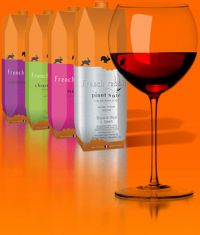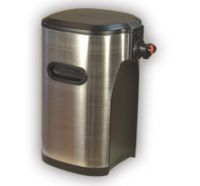Wine is a big business in BC. Any licensed restaurant sells wine; we have a growing number of wineries in the province, and the quality of those wines is better than ever. Now the wine industry is trying to address some long-time problems affecting the quality of wine and its overall sustainability.
Let’s talk about quality first. There are lots of things that can go wrong with a wine once it leaves the winery. There could be a problem with the cork or even the screw top and the wine can be spoiled. Improper storage could also lead to spoiled bottles of wine. The percentage of corked or tainted bottles varies widely depending on who you talk to but no one denies it exists, from a low of 1 or 2 percent of all bottles up to 10 or 15 percent. The other factor that can ruin the taste of a wine is the practice in restaurants of selling it by the glass. Once that wine has been opened it usually just sits on the bar with the cork kind of shoved partly in. You really only have a couple of days in which to sell it before it becomes oxidized and doesn’t really taste the way it’s supposed to.
But bars and restaurants want to give the customer more selection, or if you are there for a multi-course meal you might want to start with a glass of sparkling wine, then move on to a white for a fish course and then a red for a meat course, for example. Or you just don’t want to buy a whole bottle because you have to drive home and we have pretty tough drinking and driving regulations. So what we are starting to see now are more systems in restaurants designed to cut down on the spoilage. Some systems allow you to hook your open bottles up to a climate-controlled system that will keep them fresher and doesn’t allow air into the open bottles. Not bad, but you still have to fuss with opening the bottles (which may be corked) and putting them into the system, and if you have some top sellers that could slow you down.
 FreshTap
FreshTap
Last week I checked out a relatively new system being used at the Hotel Grand Pacific called FreshTap. The FreshTap company represents a growing number of BC wineries, near 50 now, who send stainless steel drums of wine to Vancouver, where FreshTap dispenses the wine into steel kegs that hold the equivalent of 25 750-mL bottles of wine. They get installed to a tap system that looks like a beer on tap system from the outside and suddenly you have wine on tap. The kegs get filled with an inert gas as they get drained to keep oxygen from getting in and once you open a keg, the wine will keep fresh for six to eight MONTHS.
Joe Luckhurst is the marketing manager for Road 13 Vineyards in the South Okanagan and they love the FreshTap system. Joe told me it’s very desirable to get on a ‘wine by the glass’ list in restaurants, since it’s a good form of regular sales and great for your branding. But there is the worry of the wine not being served at its best. The FreshTap system eliminates that worry, and he told me that since signing on with the system they’ve had to put more and more wine aside from their bottling line to satisfy the accounts they have with various restaurants. He’s glad they got in when they did and he’s very happy that FreshTap even has a winemaker on staff to make sure all the transfers from tank to kegs are done properly.
 Tetra Pak wine
Tetra Pak wine
Diverting wine from their bottling line for the kegs amounts to a savings in packaging as well, and that’s the other problem wineries are dealing with when it comes to creating a more sustainable industry…bottles are heavy, they’re expensive, and they can take up a lot of room in a landfill if they’re not recycled. That’s why we are seeing more wines being sold in Tetra-Pak style packaging and the larger boxes that hold 3-litres at a time. Here’s what Tetra-Pak says about wines sold in their packaging: wine in Tetra Pak cartons uses 92% less packaging to deliver the same amount of wine in glass bottles; 54% less energy throughout the entire life cycle; 80% less greenhouse gases; and 35-40% fewer trucks.
 Boxxle
Boxxle
There is still a stigma about buying wine either ‘on tap’ or from a Tetra-Pak or big box. Shauna Burry at FreshTap likens the battle for acceptance for wine in a keg to that of getting people to like wine with screwtops, or Stelvin closures as most of them are called. I think people are a lot more accepting of screwtop wines now, especially wines that aren’t meant to be aged after they’ve been bottled. And if you’re concerned about how a box of wine might look on your counter or bar, there is a company out of the States that has invented a swishy looking container called a Boxxle. You take your 3-litre bag out of its box and slip it into the Boxxle, which has a spring in it that keeps squishing the wine toward the spout as it empties, so you never have to tilt it or squish it to get out the last glass, and the spout is at the top, so you don’t have to hang the Boxxle over a counter to get your wine glass underneath it. So as more companies try to reduce their packaging and shipping costs, and as these kind of solutions become more widely accepted, you’re going to get more quality and more selection along with more sustainability.


I am having a large number of family members visit this Christmas season. I would like to serve local wines if possible. Could you tell me if any of the Vancouver Island wineries sell wine in the large box/tetra pacs?
Thanks
Hi Chris, off the top of my head I don’t know of any VI wineries selling in boxes or tetra paks. They probably can’t afford the diversity of packaging lines. But you may be able to find some BC wines from the rest of the province in boxes. They may tend to be the lower end of the line, or even be made in BC but from foreign-sourced base wines or juices. Check the labels!